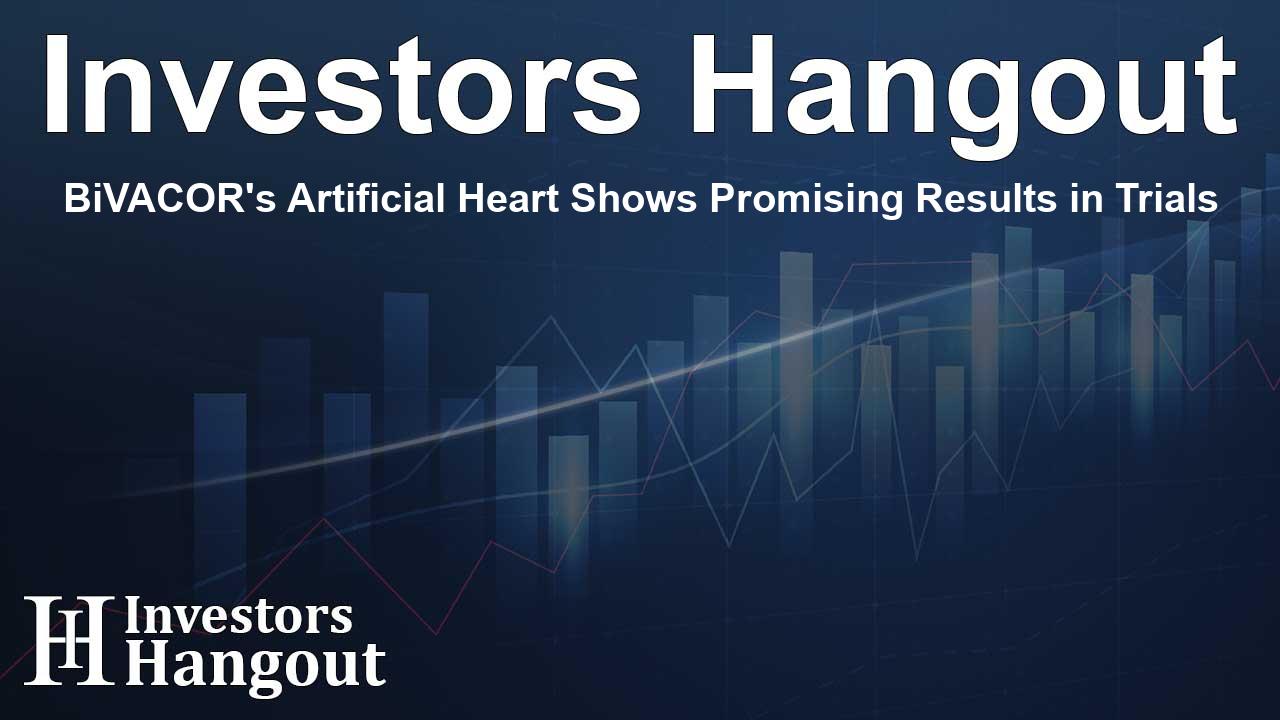BiVACOR's Artificial Heart Shows Promising Results in Trials

Breakthrough in Artificial Heart Technology
BiVACOR, a clinical-stage medical device company, has made remarkable strides with its Total Artificial Heart (TAH), successfully implanting the device in five patients as part of an FDA Early Feasibility Study. This significant achievement showcases the company’s commitment to providing innovative solutions for patients grappling with severe heart issues.
Successful Patient Implantations
The FDA Early Feasibility Study was designed to evaluate the safety and effectiveness of the BiVACOR TAH as a bridge to heart transplant for patients facing severe biventricular failure. The initial phase saw five patients receiving the BiVACOR TAH and subsequently undergoing heart transplants. Impressively, all patients experienced smooth recoveries and were discharged from the hospital, showcasing the device's promise and reliability.
Technology Behind the BiVACOR TAH
The BiVACOR TAH features groundbreaking technology, utilizing magnetic levitation, which is inspired by the mechanisms seen in high-speed trains. This remarkable device is compact and lightweight, designed to accommodate both men and women, and is capable of generating sufficient cardiac output even during physical exertion. Its unique pump design consists of magnetically suspended components, ensuring optimal performance while minimizing mechanical wear.
Positive Feedback from Medical Professionals
Leaders in the medical field have expressed their enthusiasm regarding the functionality of the BiVACOR TAH. Daniel Timms, PhD, founder and Chief Technology Officer of BiVACOR, praised the initial outcomes of the clinical trials, emphasizing the importance of the contributions from patients and clinical partners. This collaborative effort has been pivotal in advancing the TAH towards broader usage and acceptance.
The Support of the Medical Community
William Cohn, MD, BiVACOR's Chief Medical Officer, highlighted the TAH's excellent safety profile, stating that none of the implanted patients faced complications or strokes. This notable success has opened up new avenues for continued collaboration with the FDA, aiming to expand the feasibility study to include an additional fifteen patients.
Clinical Locations Involved in the Study
The groundbreaking procedures took place at The Texas Heart Institute, with contributions from renowned medical centers such as St. Luke’s Medical Center, Baylor College of Medicine, Duke University Hospital, Banner-University Medical Center Phoenix, and Christ Hospital – Heart and Vascular Center. These partnerships have bolstered the development and testing of the BiVACOR TAH, propelling it towards vital advancements in cardiac care.
Commitment to Advancing Heart Failure Treatment
The BiVACOR Total Artificial Heart is currently available for investigational use and has not yet received approval for commercial use. The primary goal is to extend life and improve quality of life for individuals suffering from end-stage heart failure while they await transplant.
About BiVACOR
BiVACOR is a pioneering medical device company dedicated to developing long-term therapies for patients dealing with biventricular heart failure. Under the guidance of its founder, Daniel Timms, PhD, and respected heart surgeons William E. Cohn, MD, and O.H. (Bud) Frazier, MD, BiVACOR is at the forefront of shaping future solutions in cardiac care. With its headquarters in Huntington Beach, California, and clinical offices in Houston, Texas, BiVACOR aims to address the pressing global need for effective heart failure treatments.
Frequently Asked Questions
What is the BiVACOR Total Artificial Heart?
The BiVACOR Total Artificial Heart is a groundbreaking medical device designed to replace a failing heart, providing life-saving support for patients awaiting a heart transplant.
How many patients received the BiVACOR TAH?
Five patients received the BiVACOR Total Artificial Heart during the initial phase of the FDA Early Feasibility Study.
What technology does the BiVACOR TAH use?
The BiVACOR TAH employs magnetic levitation technology, providing an innovative and efficient pumping mechanism that minimizes wear and trauma during operation.
Where were the implants performed?
The implantations of the BiVACOR TAH were carried out at several leading medical centers, including The Texas Heart Institute and Duke University Hospital.
Is the BiVACOR TAH approved for commercial use?
Currently, the BiVACOR Total Artificial Heart is available only for investigational use and has not yet received full clinical approval for general market use.
About The Author
Contact Dylan Bailey privately here. Or send an email with ATTN: Dylan Bailey as the subject to contact@investorshangout.com.
About Investors Hangout
Investors Hangout is a leading online stock forum for financial discussion and learning, offering a wide range of free tools and resources. It draws in traders of all levels, who exchange market knowledge, investigate trading tactics, and keep an eye on industry developments in real time. Featuring financial articles, stock message boards, quotes, charts, company profiles, and live news updates. Through cooperative learning and a wealth of informational resources, it helps users from novices creating their first portfolios to experts honing their techniques. Join Investors Hangout today: https://investorshangout.com/
The content of this article is based on factual, publicly available information and does not represent legal, financial, or investment advice. Investors Hangout does not offer financial advice, and the author is not a licensed financial advisor. Consult a qualified advisor before making any financial or investment decisions based on this article. This article should not be considered advice to purchase, sell, or hold any securities or other investments. If any of the material provided here is inaccurate, please contact us for corrections.
